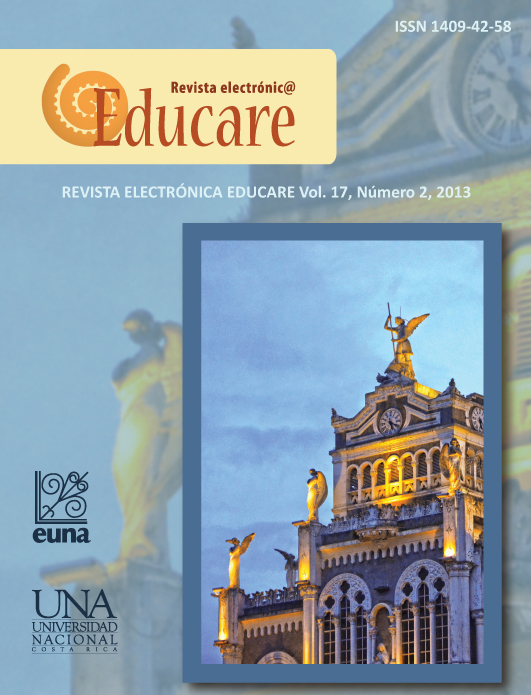Pedagogical Intervention as a Challenge of University Education. Towards an Articulated Practice
DOI:
https://doi.org/10.15359/ree.17-2.10Keywords:
Pedagogy, professional practice, educational intervention, university training, curriculum, special education needs, university curriculum.Abstract
The following addresses the importance of the pedagogical intervention process undertaken by the students of the Faculty of Education. This process can be considered as backbone of dialogic confrontation between theory and practice. The main objective is to generate an analysis to reflect on the true intentions that are born not only from each university course, but also to evaluate the creation of a coordinated and interrelated proposal enriched by each grade level. The main intention is to enrich university education starting from posing questions that allow us to assess how the process is structured, not only from the coordination achieved between courses each period, but also from the relationship that should exist in the construction of conceptual, practical and attitudinal strengths that are created both gradually and sequentially. The construction of an alternative development proposal is seeked; one which starts with the learning processes’ sequenced and linked coordination.
References
División de Educación Básica, Centro de Investigación y Docencia en Educación, Universidad
Nacional. (s. f.). Curso de construcción pedagógica desde el aula escolar (DBJ-2012). Heredia,
Costa Rica: Autor.
Ministerio de Educación Pública. (2005). Programas de Estudio del Ministerio de Educación
Pública. San José, Costa Rica: Autor.
TEDxPura VidaED. (Productor). (2012). Educación subversiva [Video]. Recuperado de
Downloads
Published
How to Cite
Issue
Section
License
1. In case the submitted paper is accepted for publication, the author(s) FREELY, COSTLESS, EXCLUSIVELY AND FOR AN INDEFINITE TERM transfer copyrights and patrimonial rights to Universidad Nacional (UNA, Costa Rica). For more details check the Originality Statement and Copyright Transfer Agreement
2. REUTILIZATION RIGHTS: UNA authorizes authors to use, for any purpose (among them selfarchiving or autoarchiving) and to publish in the Internet in any electronic site, the paper´'s final version, both approved and published (post print), as long as it is done with a non commercial purpose, does not generate derivates without previous consentment and recognizes both publisher's name and authorship.
3. The submission and possible publication of the paper in the Educare Electronic Journal is ruled by the Journal’s editorial policies, the institutional rules of Universidad Nacional and the laws of the Republic of Costa Rica. Additionally, any possible difference of opinion or future dispute shall be settled in accordance with the mechanisms of Alternative Dispute Resolution and the Costa Rican Jurisdiction.
4. In all cases, it is understood that the opinions issued are those of the authors and do not necessarily reflect the position and opinion of Educare, CIDE or Universidad Nacional, Costa Rica. It is also understood that, in the exercise of academic freedom, the authors have carried out a rogorous scientific-academic process of research, reflection and argumentation thar lays within the thematic scope of interest of the Journal.
5. The papers published by Educare Electronic Journal use a Creative Commons License:














 The articles published by Educare Electronic Journal can be shared with a Creative Commons License:
The articles published by Educare Electronic Journal can be shared with a Creative Commons License: 



